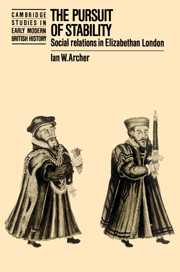Book contents
- Frontmatter
- Contents
- List of figures
- List of tables
- Acknowledgements
- List of abbreviations
- 1 INTRODUCTION: THE PROBLEM OF ORDER
- 2 THE FRAMEWORK OF SOCIAL RELATIONS: THE CITY ELITE
- 3 THE FRAMEWORK OF SOCIAL RELATIONS: LOCAL GOVERNMENT, NEIGHBOURHOOD, AND COMMUNITY
- 4 THE FRAMEWORK OF SOCIAL RELATIONS: THE LIVERY COMPANIES
- 5 SOCIAL POLICY
- 6 CRIME AND SOCIETY
- 7 CONCLUSION
- Bibliography
- Index
- Cambridge Studies in Early Modern British History
- Frontmatter
- Contents
- List of figures
- List of tables
- Acknowledgements
- List of abbreviations
- 1 INTRODUCTION: THE PROBLEM OF ORDER
- 2 THE FRAMEWORK OF SOCIAL RELATIONS: THE CITY ELITE
- 3 THE FRAMEWORK OF SOCIAL RELATIONS: LOCAL GOVERNMENT, NEIGHBOURHOOD, AND COMMUNITY
- 4 THE FRAMEWORK OF SOCIAL RELATIONS: THE LIVERY COMPANIES
- 5 SOCIAL POLICY
- 6 CRIME AND SOCIETY
- 7 CONCLUSION
- Bibliography
- Index
- Cambridge Studies in Early Modern British History
Summary
A CRIMINAL UNDERWORLD?
Earlier chapters have stressed the integrating functions of the livery companies and of the overlapping institutions of local government, as well as the responsiveness of the elite to the impoverishment of the sixteenth century. But it needs to be recognised that by no means all the city's inhabitants were so well integrated or cared for. The capital was notorious for its criminality and contemporaries firmly believed there to be a counter-culture of deviants. Foreign visitors frequently drew attention to the prevalence of crime about the metropolis and the regular flow of criminals to the gallows. Their verdict is supported by those, like Recorder Fleetwood, who were actively involved in fighting London crime. ‘Here are fortie brables and pickeries done abowt this towne more in any one daye than when I first came to serve was done in a moneth’, he wrote in 1582. The aldermen concurred, complaining in 1601 of ‘the great numbers of idle, lewd, and wicked persons flocking and resorting hither from all parts of this realm which do live here and maintain themselves chiefly by robbing and stealing’. Clerics fulminated against vagrants as ‘the very filth and vermin of the common wealth … the very Sodomites of the land, children of Belial, without God, without minister; dissolute, disobedient, and reprobate to every good work’. The Elizabethan reading public was saturated in the image of a deviant counter-culture.
- Type
- Chapter
- Information
- The Pursuit of StabilitySocial Relations in Elizabethan London, pp. 204 - 256Publisher: Cambridge University PressPrint publication year: 1991



